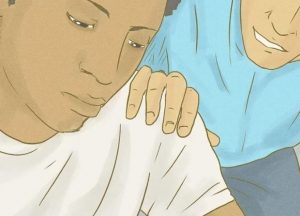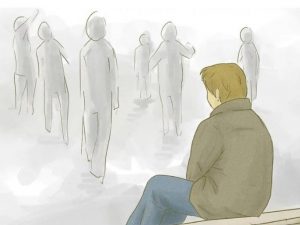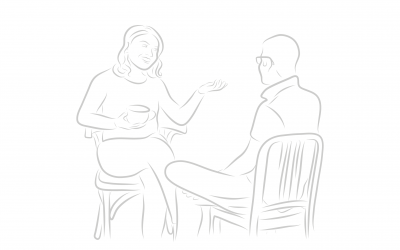The first line of defense for patients in the fight against disease is their family and friends. When you are aware of the signs and symptoms of depression, you will be able to detect the symptoms of depression in friends or family members before they become aware of them, and your support and sympathy will encourage them to seek treatment.
We can learn how to provide support and understanding to people who are suffering from depression, and also how to find resources to help them cope.
Below are the details.

Recognize the signs and symptoms of depression
Most people suffering from depression experience symptoms that are severe enough to interfere with their daily activities. Others may experience general feelings of misery or unhappiness without understanding the cause. Depression can manifest itself as irritability or crankiness rather than sadness in children and adolescents.
There is no doubt that depression is a serious mental illness. Depression should not be underestimated. In addition to draining one’s energy and motivation, depression can also deplete one’s optimism.
People suffering from depression may have difficulty connecting emotionally with anyone, even the people they love the most. As well as saying hurtful things and expressing anger angrily, depression also causes people to lash out and say hurtful things.
Attempting to hide a problem will not result in its disappearance. The best thing you can do for a friend or family member suffering from depression is not to make excuses, cover up the problem, or lie about it. A depressed individual may not seek treatment as a result of this.
Depression does not cause people to become lazy or unmotivated. The mere thought of doing the things that might make someone feel better can be exhausting when one is depressed, resulting in people not taking action. Please be patient while the person who is depressed takes the first steps toward recovery.
Your love and support may be helpful to a person who is suffering from depression, but ultimately, it is up to him or her to recover.

Encourage the healing process
Depression may not be recognized or acknowledged by depressed individuals. It is possible that they may not be aware of the signs and symptoms of depression, so they may believe that what they are experiencing is normal.
Often, people feel ashamed of their depression and believe that their willpower alone is sufficient to overcome it. Depressive disorders rarely improve without treatment, and they may even worsen without treatment. Your loved one can recover if he or she receives the appropriate treatment and help.
You can help in the following ways:
■ Talk to your friend or family member who suffers from depression about what you have observed and the reasons for your concern.
■ Explain him or her that depression is a medical condition, not a character flaw or weakness and that it usually improves with treatment.
■ Suggest seeking help from a professional a doctor or mental health provider, such as a licensed psychotherapist.
■ Assist in preparing a list of questions for your initial consultation with your physician.
■ Ensure that you are willing to help by scheduling appointments, accompanying appointments and attending family therapy sessions.
■ When the patient’s condition is serious or potentially life-threatening, contact a doctor, hospital, or emergency medical services.
A person suffering from worsening depression should be treated as soon as possible. The patient should be encouraged to work with a mental health provider or doctor to develop a plan for what to do when the signs and symptoms reach a certain level.

Be aware of the risk of suicide
Suicide is more likely to occur among people who suffer from depression. The patient may feel suicidal at some point if he or she has severe depression. Suicidal behavior should be taken seriously and addressed immediately.
■ Talk to him or her about your concerns. Ask him or her if he or she is considering self-harm or has plans for how to commit suicide. Suicide attempts are more likely to occur when a plan has been formulated.
■ Seek help. If you need medical assistance, please contact your doctor, mental health provider, or other health care professional. Ensure that other members of your family or close friends are aware of the situation.
■ Help him/her to contact a suicide hotline or help him/her in doing so. If you are living in Canada, call Suicide Canada Prevention at 1.833.456.4566 for help 24 hours a day, 7 days a week.
What can you do for the person with depression?
■ Maintain adherence to the treatment plan. You can help your family member, relative or friend who is being treated for depression in remembering to take prescribed medications and to attend appointments with their doctors or therapists.
■ Listen with an open mind. Let him or her know that you are interested in learning how they are feeling. Listen carefully when he or she wants to speak, but do not give advice or make judgments. An effective healing tool is simply listening and understanding.
■ Encourage positive behavior. People who suffer from depression may feel harshly judged and find fault with everything they do.
■ Offer help. There may be certain tasks that he or she is unable to handle well.
■ Maintain a low-stress environment. Maintaining a regular lifestyle may aid in the sense of control that a person with depression experiences.
■ Offer assistance with setting up a schedule for meals, medications, physical activity and sleep, as well as with household chores.
■ Find out which organizations can be helpful. There are some organizations that provide support groups, counseling, and other resources to help individuals suffering from depression.
■ Encourage the practice of spirituality if appropriate. Whether it is involvement in a religious community or individual spirituality and practices, faith can play a significant role in the recovery process from depression.
■ Together, develop a plan. Engage him or her in a hobby or other activity he or she used to enjoy with you, such as a walk, a movie, or a hobby. Do not try to force him or her to comply with your instructions.
How can you take care of yourself?
■ Learn more about depression. You will be able to help the person you care about if you have a better understanding of the causes of depression, how it affects people, and how to treat it.
■ Maintain a healthy lifestyle. Consider asking other relatives or friends to assist and taking steps to avoid becoming depressed or exhausted. Be sure to take time for yourself, to enjoy hobbies, physical activities, friends, and to renew your spirituality.
■ Practice effective communication. Talk openly with your friends about your concerns instead of making depression a taboo topic. Communicate without blaming the other person and take ownership of your feelings and concerns. As a friend, you listen to your friend and provide them with unconditional emotional support. Finally, please be patient.
The symptoms of depression can be improved with treatment, but it may take some time. Trying more than one medication or therapy may be necessary in order to find the most effective treatment.
I am Ashin Sumanacara , a writer, spiritual counselor, and mindfulness coach. Hope you find my thoughts and ideas helpful. Let me know if you would like me to write about a specific topic. It would be great to hear from you via private message or comment.





0 Comments